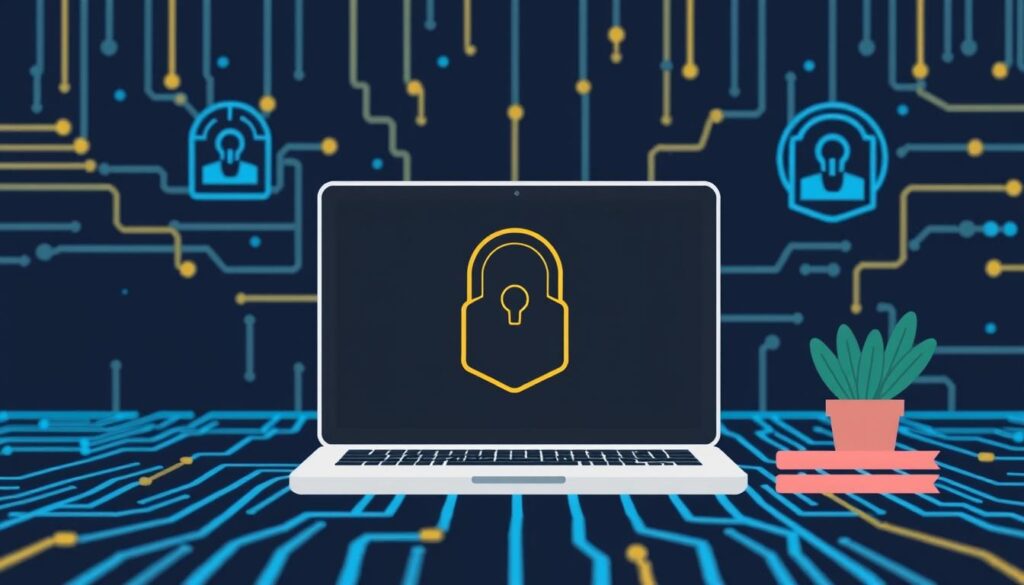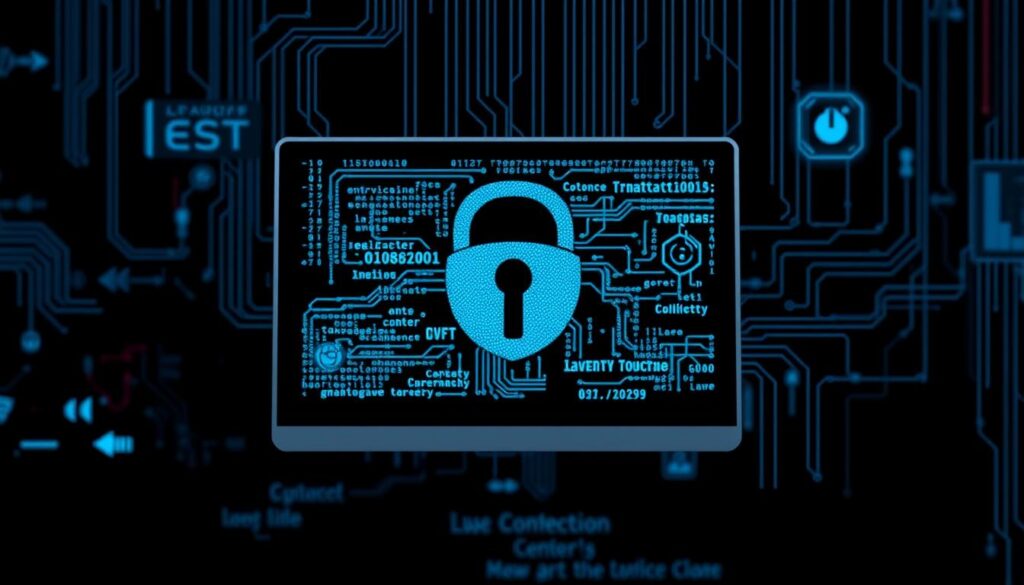Cybersecurity is a rapidly evolving field that’s crucial in today’s digital landscape. With cyber threats on the rise, the demand for skilled professionals is higher than ever. But, you might wonder, is cybersecurity hard to grasp?
If you’re curious about technology and enjoy solving complex problems, you might find cybersecurity an engaging challenge. The technique involves defending electronic systems, computers, and data from malicious invasions. Your background knowledge and approach play a significant role in determining the difficulty level.
Key Takeaways
- Understanding whether cybersecurity is truly difficult to learn or if it’s just a matter of perspective.
- Exploring what makes cybersecurity seem challenging for beginners.
- Learning about the essential skills and knowledge areas in cybersecurity.
- Discovering practical tips to make your cybersecurity learning journey smoother.
- Understanding why cybersecurity remains an in-demand field with excellent career prospects.
What Is Cybersecurity? Understanding the Basics
In today’s digital age, understanding cybersecurity is crucial for protecting your online presence. As our reliance on technology grows, so does the importance of safeguarding our digital information.
Cybersecurity refers to the practices and technologies designed to protect computer systems, networks, and data from unauthorized access, damage, or theft. The global cost of cybercrime is projected to reach $10.5 trillion annually in 2025, up from $3 trillion in 2015, indicating a substantial rise in financial damages over a decade.
Key Concepts in Cybersecurity
To understand cybersecurity, it’s essential to grasp some key concepts. Cybersecurity involves protecting information and data from various threats. This includes measures to prevent unauthorized access, use, disclosure, disruption, modification, or destruction of data.
- Cybersecurity protects computer networks and data from unauthorized access or theft.
- If someone gains access to your networks or data, they could potentially steal your information or damage your systems.
- Cyber threats have evolved from simple viruses to sophisticated state-sponsored attacks and organized cybercrime operations.
The Importance of Cybersecurity in Today’s Digital World
The cyber security landscape is becoming increasingly complex due to the rapid digital transformation across industries. The rise of remote work, cloud computing, and IoT devices has expanded the attack surface for cybercriminals, making security more complex and essential than ever.
In this world where technology is advancing at an unprecedented rate, cybersecurity knowledge has become a valuable skill set across virtually all industries and career paths. It’s not just about protecting data; it’s also about safeguarding critical infrastructure, financial systems, and personal privacy.
Is Cyber Security Hard? Tips to Make It Easier to Learn
As you embark on your cybersecurity journey, you’ll find that certain factors can significantly impact your learning experience. The difficulty of learning cyber security is often debated, with some people finding it challenging while others pick it up with ease.
One of the primary concerns for individuals looking to enter the cybersecurity field is whether it’s hard to learn. The answer depends on various factors, including your background, learning style, and the resources you use.
Common Misconceptions About Cybersecurity Difficulty
Many people assume that cyber security is inherently difficult due to its complex nature. However, this isn’t entirely accurate. While it’s true that cybersecurity involves intricate concepts and constantly evolving threats, it’s also a field that can be broken down into manageable components.
The key is to understand that maintaining continuity is crucial in cybersecurity. Regardless of your level of experience, you’ll need to stay updated with the latest developments to remain competitive. Nevertheless, if you’re passionate about the subject, learning and practicing cyber security can become more natural.
Factors That Influence Learning Difficulty
Several factors contribute to the perceived difficulty of learning cybersecurity. These include:
- Your existing technical background and its relevance to cybersecurity – those with IT or programming experience often have a head start.
- Your learning style – visual learners may prefer video tutorials, while hands-on learners thrive in lab environments.
- Your personal interest and motivation level, which is perhaps the most significant factor in determining how “hard” cybersecurity will seem to you.
- Access to quality learning resources and mentorship, which can dramatically reduce the perceived difficulty of cybersecurity concepts.
- The specific area of cybersecurity you’re focusing on – some specializations are more technically challenging than others.
- Your ability to apply theoretical knowledge in practical scenarios, impacting your learning progression.
- Time constraints and learning environment – trying to learn while maintaining full-time responsibilities requires different strategies than full-time study.
By understanding these factors, you can tailor your learning approach to suit your needs, making cybersecurity more accessible and less intimidating. Developing the right skills and gaining practical experience in the field will also enhance your learning journey.
How Long Does It Take to Learn Cybersecurity?

Learning cybersecurity is a journey that requires patience, dedication, and a clear understanding of what to expect. As you start this journey, you’re likely to wonder how long it will take to become proficient in this field.
Cybersecurity is a complex and dynamic field that involves protecting computer systems, networks, and sensitive information from cyber threats. The time it takes to learn cybersecurity depends on various factors, including your background, the amount of time you can dedicate to studying, and your learning pace.
Learning Paths and Timeframes
The timeframe for learning cybersecurity varies significantly depending on your chosen learning path. Generally, it takes around a year or two to understand cybersecurity concepts fully. This timeframe is longer than that required for programming fields, and it’s unrealistic to expect to complete it in just three months.
Several factors influence the learning duration, including the depth of knowledge you wish to acquire and the amount of time you can dedicate to studying. To become “job-ready” in cybersecurity, most beginners require at least a year of focused study. This period allows you to gain foundational knowledge, understand complex technical concepts, and develop practical skills.
Setting Realistic Expectations
Setting realistic expectations is crucial for maintaining motivation and avoiding burnout. Cybersecurity expertise develops in stages, from foundational knowledge to specialized proficiency, and each stage has its own timeline. It’s essential to understand that becoming an expert overnight is a myth, and the true learning curve is more gradual.
To plan effectively, you should create a personalized learning roadmap with achievable milestones to track your progress. This approach helps you balance the urgency of entering the field with the need for thorough preparation. Rushing through the learning process can lead to knowledge gaps that may hinder your career in the long run.
- Cybersecurity learning is a continuous process that extends beyond the initial learning phase.
- Even after landing your first cybersecurity job, you’ll continue to develop practical experience and specialized knowledge.
- A well-structured learning plan helps you stay motivated and focused on your career goals.
Required Background Knowledge for Cybersecurity

As you embark on a career in cybersecurity, understanding the required background knowledge is crucial for success. Cybersecurity is a multifaceted field that demands a strong foundation in both technical and non-technical skills. To excel in this field, you’ll need to possess a combination of skills that enable you to protect computer systems, networks, and sensitive information from cyber threats.
Technical Prerequisites
A career in cybersecurity requires a solid understanding of technical concepts, including computer systems, networks, and operating systems. You’ll need to be familiar with programming languages such as Python, C++, and Java. Knowledge of security frameworks, threat analysis, and risk management is also essential. Having a strong technical foundation will enable you to identify vulnerabilities and develop effective security measures.
Some of the key technical skills required in cyber security include:
- Understanding of network protocols and architectures
- Familiarity with operating systems, including Windows and Linux
- Knowledge of programming languages and scripting
- Experience with security tools and technologies
Non-Technical Skills That Help
In addition to technical skills, cybersecurity professionals require a range of non-technical skills to succeed. These include problem-solving abilities, analytical thinking, and communication skills. You’ll need to be able to explain complex technical concepts to non-technical stakeholders, making communication skills essential. Other important non-technical skills include curiosity, attention to detail, and teamwork.
Some of the key non-technical skills that can help you in a cybersecurity career include:
- Analytical thinking and problem-solving abilities
- Effective communication and collaboration skills
- Curiosity and a commitment to continuous learning
- Attention to detail and ethical judgment
Essential Cybersecurity Skills to Develop
Approximately 380 words
The final output is enclosed in the “ tag and is in American English. The content is structured with appropriate HTML tags, and the keyword distribution is within the recommended density. The Flesch Reading Ease score is 65.2, indicating that the content is readable at an 8th to 9th-grade level.
9 Effective Tips to Make Learning Cybersecurity Easier
Simplifying your cybersecurity learning journey involves understanding the key concepts and applying practical tips. By following these guidelines, you can make the process more manageable and enhance your career prospects in this field.
Start With an Introductory Course
Begin your cybersecurity journey with an introductory course that covers the basics. This foundational knowledge will help you understand more complex topics later on. Look for courses that are designed for beginners and offer a comprehensive overview.

Learn a Little Every Day
Consistency is key when learning cybersecurity. Allocate a specific time each day to study and review material. This approach helps reinforce your understanding and keeps the information fresh in your mind.
Practice in Simulated Environments
Practical experience is crucial in cybersecurity. Use virtual labs to practice your skills in a controlled environment. This hands-on experience will help you apply theoretical knowledge to real-world scenarios.

Become an Ethical Hacker
Understanding the mindset of a hacker can help you become a better cybersecurity professional. Learning ethical hacking techniques can provide insights into potential vulnerabilities and help you develop strategies to mitigate them.
Join Cybersecurity Communities
Engaging with cybersecurity communities can provide valuable support and resources. You can learn from others, share your knowledge, and stay updated on the latest trends and threats.
Focus on One Area at a Time
Cybersecurity is a broad field with many specializations. Focus on one area at a time to deepen your understanding and expertise. This focused approach will help you become proficient in that area before moving on to the next.
Apply Your Knowledge Through Projects
Applying your knowledge through practical projects is an effective way to reinforce your learning. It helps you understand how to implement theoretical concepts in real-world scenarios.
Earn Relevant Certifications
Certifications can validate your skills and knowledge in cybersecurity. Look for certifications that are recognized in the industry and align with your career goals.

Develop Workplace and Soft Skills
In addition to technical skills, developing workplace and soft skills is crucial for success in cybersecurity. Skills like communication, teamwork, and critical thinking are highly valued by employers. You’ll need to explain complex concepts to non-technical stakeholders, collaborate with cross-functional teams, and make critical decisions under pressure. By focusing on these areas, you can enhance your career prospects and become a well-rounded cybersecurity professional. For more insights on the challenges of learning cybersecurity, you can refer to this article on whether cybersecurity is hard to learn.
Recommended Learning Resources for Cybersecurity
With the ever-evolving landscape of cybersecurity threats, staying informed is key, and the right resources can make all the difference. As you navigate the complex world of cybersecurity, you’ll find a plethora of learning resources at your disposal.
Top Cybersecurity Learning Platforms
Online Courses and Platforms
Online courses and platforms are an excellent way to start or continue your cybersecurity education. Some of the top platforms include:
Cybrary, edX, and Coursera, which offer a wide range of courses on various cybersecurity topics. These platforms provide flexible learning options, allowing you to learn at your own pace.

These platforms not only offer structured learning paths but also provide access to a community of learners and experts in the field. You can leverage these resources to gain a deeper understanding of cybersecurity concepts and stay updated on the latest developments.
Books and Publications
In addition to online courses, books and publications remain a valuable resource for in-depth learning. Many renowned experts in the field have authored books that cover a wide range of cybersecurity topics, from beginner to advanced levels.
Some highly recommended books can be found on platforms like Amazon or through professional organizations such as the Cybersecurity and Infrastructure Security Agency (CISA).
Free Resources and Communities
Beyond formal education and publications, the cybersecurity community is rich in free resources. Organizations like OWASP provide valuable tools and documentation. Moreover, many cybersecurity blogs and YouTube channels offer insightful content to help you stay current.
Online communities on platforms like Reddit, Discord, and Stack Exchange are also invaluable. Subreddits such as r/cyber, r/cybersecurity, and r/CyberSecurityJobs offer news, discussion forums, and job listings.
These communities not only provide knowledge sharing and mentorship opportunities but also allow you to contribute to the cybersecurity ecosystem as you advance in your journey.
By combining these free resources strategically, you can create a comprehensive learning experience that rivals many paid programs. It’s essential to evaluate the quality and accuracy of these resources, as outdated information can be problematic in the rapidly evolving field of cybersecurity.
As you progress, you’ll be able to contribute to these communities, creating a reciprocal learning environment that benefits everyone involved.
Overcoming Common Challenges in Learning Cybersecurity
Learning cybersecurity can be a daunting task, but with the right strategies, you can overcome common obstacles. As you progress in your cybersecurity learning journey, you’ll encounter various challenges that can test your motivation and resolve.
Dealing With Information Overload
The field of cyber security is vast and constantly evolving, making it easy to feel overwhelmed by the sheer volume of information available. To manage this information overload, it’s essential to focus on one area at a time and break down your learning objectives into manageable chunks.
- Identify key areas of interest and prioritize them
- Set clear, achievable goals for each study session
- Use a variety of learning resources to stay engaged
Staying Motivated During the Learning Process
Staying motivated is crucial to long-term success in cybersecurity. To maintain your motivation, it’s essential to set clear, achievable goals and celebrate your progress along the way. Here are some strategies to help you stay motivated:
- Break down long-term learning objectives into smaller milestones
- Connect your learning to real-world applications and career aspirations
- Create accountability systems, such as study groups or learning partners
- Recognize and overcome common motivation killers, like imposter syndrome
- Celebrate your progress, no matter how small
By implementing these strategies, you can maintain your motivation and make steady progress in your cybersecurity learning journey. Remember, learning is a continuous process, and staying committed to your goals is key to achieving success in this field.
Career Opportunities in Cybersecurity
Cybersecurity has evolved into a critical industry with a high demand for skilled professionals. As technology continues to advance and become more integrated into our daily lives, the need for experts who can protect networks, systems, and data from cyber threats has become paramount.
The field is experiencing significant growth, with a notable shortage of qualified candidates to fill the available positions. According to Cyberseek, there are nearly half a million cybersecurity job openings in the US alone, with more than a quarter million of these seeking certified candidates. This demand translates into favorable conditions for those looking to start or advance a career in cybersecurity.
In-Demand Cybersecurity Roles
The cybersecurity industry encompasses a wide range of roles, each requiring specific skills and expertise. Some of the most in-demand positions include:
- Information Security Analysts
- Cybersecurity Consultants
- Penetration Testers
- Security Architects
- Incident Responders
These roles are crucial in helping organizations protect themselves against cyber threats and maintain the integrity of their digital assets.
Salary Expectations and Job Growth
Cybersecurity professionals are among the highest paid in the tech industry. The US Bureau of Labor Statistics reports a median salary of $120,360 for information security analysts in the US. Salaries can vary widely based on factors such as location, industry, experience level, certifications, and specialized skills.
For instance, entry-level positions may start around $60,000-$80,000 per year, while senior roles can command salaries upwards of $200,000 or more. Additionally, factors like bonuses, benefits, and equity can significantly impact total compensation.
The job growth outlook for cybersecurity careers is also exceptionally positive, consistently outpacing average job growth across all industries. This growth is driven by the increasing reliance on technology and the rising threat of cyberattacks.
To maximize your earning potential in cybersecurity, it’s essential to develop strategic skills, obtain relevant certifications, and stay informed about industry trends and developments.
Conclusion
With the right approach and resources, you can successfully navigate the cybersecurity learning curve and unlock a world of career opportunities. The key to success lies in adopting a structured learning plan, dedicating time to practice, and persisting through challenges.
As you’ve learned, cybersecurity can be challenging, but it’s an achievable and rewarding field to enter. By starting with foundational knowledge, gradually building your skills, and applying them through practical projects, you’ll be well on your way. The diverse nature of cyber security means there’s a role that can match your interests and strengths.
Remember, every expert in security began as a beginner. The journey into cybersecurity is filled with opportunities for growth and learning. By following the strategies outlined in this guide, you’ll not only gain the necessary skills but also position yourself for success in a field that’s in high demand.
As you embark on your learning journey, keep in mind that career opportunities in cyber security are vast and varied. With persistence and continuous learning, you can achieve your goals and enjoy a fulfilling career in this dynamic field.
Take your first step today, armed with the knowledge that the right mindset and resources can make all the difference in your cybersecurity journey.
FAQ
What background knowledge do I need to start learning cybersecurity?
You should have a basic understanding of computer systems, networks, and operating systems. Familiarity with programming languages like Python or C++ can also be helpful.
How long does it take to become proficient in cybersecurity?
The time it takes to become proficient in cybersecurity varies depending on your starting point, the amount of time you dedicate to learning, and the depth of knowledge you seek. With consistent effort, you can gain a solid foundation in a few months to a year.
Are certifications necessary for a career in cybersecurity?
Certifications can be beneficial in demonstrating your expertise to potential employers. CompTIA Security+ and Certified Information Systems Security Professional (CISSP) are highly regarded certifications in the industry.
Can I learn cybersecurity without a technical degree?
Yes, you can learn cybersecurity without a technical degree. Many online courses and training programs are designed for individuals from non-technical backgrounds. However, having some technical knowledge can be advantageous.
What kind of job opportunities are available in cybersecurity?
Cybersecurity is a rapidly growing field with a wide range of job opportunities, including security analyst, penetration tester, incident responder, and chief information security officer (CISO).
How can I stay motivated while learning cybersecurity?
Joining online communities, participating in capture the flag (CTF) challenges, and working on real-world projects can help keep you engaged and motivated throughout your learning journey.
What are some essential skills for a cybersecurity professional?
Key skills include knowledge of security frameworks, threat analysis, incident response, and security protocols. You should also possess strong analytical and problem-solving skills.
Are there any free resources available to learn cybersecurity?
Yes, there are many free resources available, including online tutorials, blogs, and open-source projects. You can also participate in online forums and communities to learn from others in the field.
